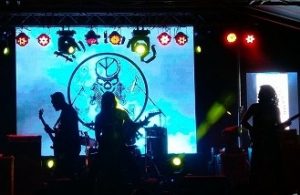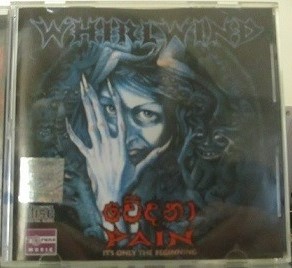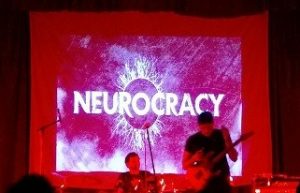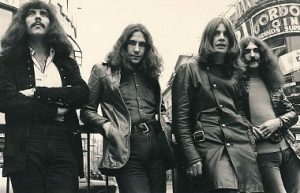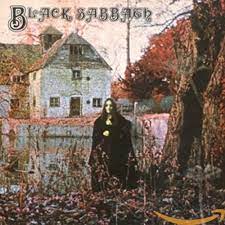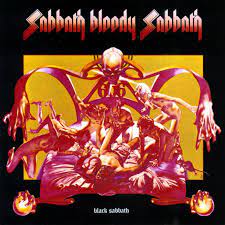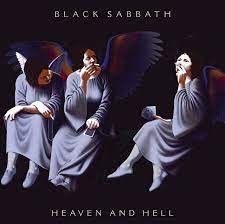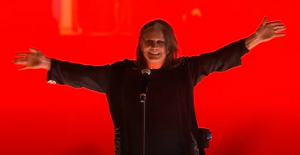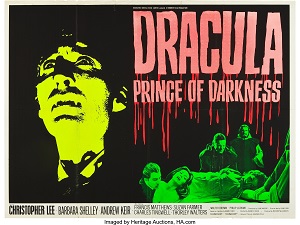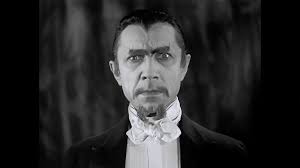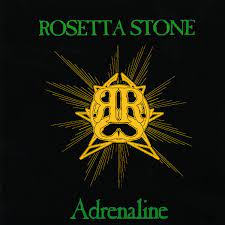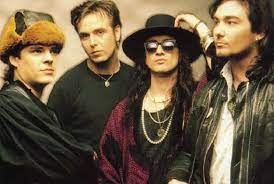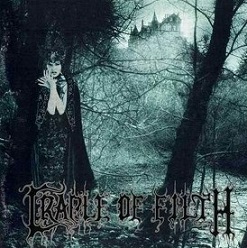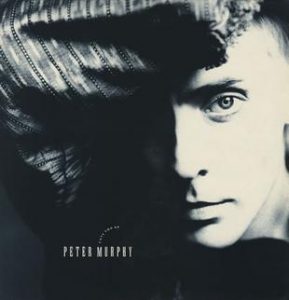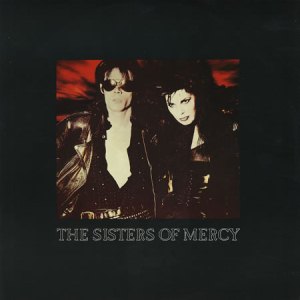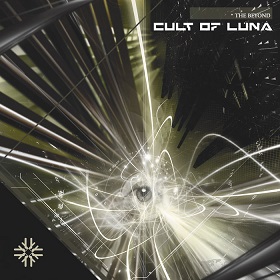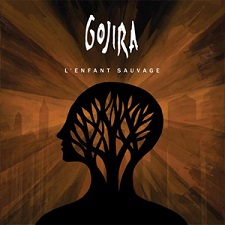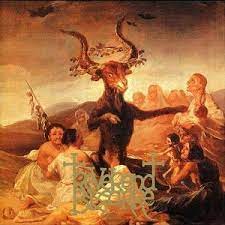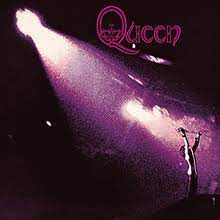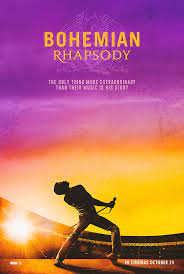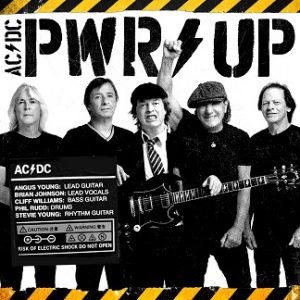
© Warner Bros.
I see the rock band Royal Blood have landed themselves in hot water. They took to the stage at Radio 1’s Big Weekend event in Dundee on May 28th and reacted to what they felt was the crowd’s lack of energy and enthusiasm by impersonating Victor Meldrew in the TV sitcom One Foot in the Grave (1990-2000). They behaved like curmudgeonly old farts. Vocalist and bassist Mike Kerr berated the audience, who mainly consisted of folk come to see the also-on-the-bill popstars Niall Horan and Lewis Capaldi, with such cantankerous remarks as: “Well, I guess I should introduce ourselves seeing as no one actually knows who we are. We’re called Royal Blood and this is rock music. Who likes rock music? Nine people, brilliant…” And: “We’re having to clap ourselves because that was so pathetic…” Plus, he flipped the crowd off while leaving the stage.
Small wonder that the band has been roasted on social media since then. Particularly brutal was a Twitter posting likening them to the long-running British TV glove puppets Sooty and Sweep.
Now I quite like Royal Blood’s music and I have a copy of their eponymous 2014 debut album somewhere in my record collection. Also, not being a pop fan, I would probably find a concert featuring Niall Horan (who was once in One Direction) and Lewis Capaldi (who I admit does have an awesome second cousin once removed) about as pleasurable as poking a sharp stick into my ear and twisting it. But if you’re in a rock band and find yourself lined up to play at an event that’s obviously going to be thronged with pop fans, you should know what to expect, leave your prejudices offstage, get on with the show and make the best of it… Or just cancel your appearance.
Come to think of it, I did once attend Radio 1’s One Big Sunday event in Ipswich in the summer of 2002, while I was working in the area. That was because I wanted to see two bands on the bill, Edinburgh rockers Idlewild and Bristol electronica outfit Kosheen. I didn’t let the fact that the bill also contained Liberty X, Ms Dynamite and Natalie Imbruglia, whom I had zero interest in, interfere with my enjoyment. As I said, at an eclectic do like this, you make the best of things.
Anyway, the recent stushie involving Royal Blood has made me look back over my gig-going career and wonder… What instances of bad behaviour by live bands have I witnessed in my time?
The most memorable onstage meltdowns came while I was living in the city of Sapporo, in Hokkaido, northern Japan, during the 1990s. Visiting Western performers frequently got annoyed at what they saw as the passivity of Japanese audiences, forgetting that there were obvious cultural reasons why a Japanese crowd might seem less extrovert and exuberant than a Western one.

From wikipedia.org / © Mari
The number-one musical misery-guts during my Japanese years was Ian Brown, frontman of the Stone Roses, who performed at the Sapporo Factory venue in 1995 to promote their recently-released album Second Coming. Brown soon got riled by what he perceived as the audience’s inactivity. “Sapporo,” he snarled, “wake up!” At this point, some New Zealand guys whom I knew yelled from the back of the hall, “Oh, you’ve remembered which city you’re in! Well done!” Brown then commented sourly about “those people at the back with faces like well-skelped arses.” I was standing a few yards from the front of the stage and couldn’t help shouting back at him, “That’s rich coming from you!” My comeback seemed to rattle Brown and I saw him both gesturing towards the side of the stage and pointing furiously down at me. “Oh shit,” I thought, “he’s trying to get the venue’s security staff onto me!” I decided I should make myself less conspicuous. This was difficult because I was rather taller than the average Japanese person and my head and shoulders stuck up prominently above the crowd. I spent the rest of the gig with legs awkwardly bent at the knees, trying to reduce my height, so that Brown and his security goons wouldn’t notice me.
To be fair, Brown had recently been beaten up in a club in Tokyo, supposedly by a trio of Australian bodybuilders, which’d no doubt left him in a foul mood for the rest of his band’s Japanese tour. Still, he behaved like a dickwad that evening and put me off the Stone Roses for a long while afterwards.
Also losing it with their northern Japanese audience were the punk band Fluffy, who in 1996 supported the Sex Pistols (in the middle of their Filthy Lucre reunion tour) at the Hokkaido Koseinenkin Hall. Singer Amanda Rootes sneered at the end, “Thank you, Sapporo, for your boring hospitality!” But it was hardly the crowd’s fault. The Hall seemed designed to strangle any atmosphere at birth – as far as I remember, it was an all-seater venue, which limited one’s ability to get up and bop and jump around to the music, and it was brightly lit. Also, the tickets had said nothing about a support band and people were still filing in to take their seats while Fluffy performed onstage. The band continued to fume about the experience later. A mate of mine who worked in a pub in Susukino, Sapporo’s nightlife district, reported that the band came into his establishment for a drink after the gig and had a moan about how horrible the city was.
On the other hand, I’ve seen a Japanese audience – well, a Japanese audience sprinkled with a number of foreigners – have a go at a band for not being lively themselves. In the mid-1990s the American outfit Sugar played at Penny Lane, Sapporo’s best small venue. Their singer, guitarist and leader Bob Mould was so intense, wrapped-up-in-himself and non-communicative between songs that, eventually, someone with a North American accent roared at him, “Why don’t you speak to us!” I should say that years later I saw Mould again, performing solo at the Oran Mor arts / entertainment centre in Glasgow, and he seemed way more chilled and looked like he was enjoying himself much more.

From wikipedia.org / © Masao Nakagami
Penny Lane was also where I witnessed a meltdown by Richey Edwards, the iconic but doomed guitarist – two years later, he’d disappear, never to be seen again – with the Welsh rock band the Manic Street Preachers. This was in 1993 and the Manics were promoting their new album Gold Against the Soul. The gig was excellent, but Edwards was clearly on edge. At one point he raged against an illuminated fire-exit sign at the auditorium’s far end that he claimed was distracting him. In a typical face-saving Japanese compromise, the venue manager didn’t turn the sign off. He just tied a big strip of cardboard over it so that nobody, including Richey, could see it, but it stayed switched on in accordance with fire regulations.
Away from Japan, I’ve observed some unprofessional behaviour onstage that was the result of physical or emotional dysfunction within the band. In 1995, in New York, I went to a gig by Shane MacGowan and the Popes. The famously raddled MacGowan – who’d already parted company with his earlier and more famous band the Pogues because of his ongoing state of dissolution – lasted all of two songs before sinking onto his haunches, clutching his head between his hands, and then slinking offstage. The rest of the band, the Popes, gamely played a few instrumental tunes for another 25 or 30 minutes. Then they buggered off too. And then there was a riot. Happily, when I saw MacGowan on two later occasions – with the Popes at the 1998 Fleadh Festival in London’s Finsbury Park and together again with the Pogues in Newcastle-upon-Tyne in 2004 – he was in better physical shape. Well, a bit better.
Meanwhile, by the time I saw the Jesus and Mary Chain in Edinburgh in 1998, the relationship between the band’s founding members, brothers Jim and William Reid, had become toxic. It showed onstage. (Jim Reid once said of the Jesus-and-Mary-Chain experience: “It’s like being locked in a cupboard with somebody for 15 years. If it wasn’t your brother, you could kick him out.”) At one point, in front of the audience, Jim roared, “William, just shut up!” when his sibling started singing a song intro off-key. It was no surprise when, the following year, the news came through that the band had split up.

© Creation / Astralwerks
I’ve also seen folk, full of boisterous, joking bonhomie, fail to read the room and say something they regretted. Most notably, I remember Primal Scream playing on the bill at a one-day event on Glasgow Green in 2000. While they were limbering up to play the song Sick City from their new album XTRMNTR, bass-player Gary ‘Mani’ Mountfield cheerfully barked into the microphone, “This is dedicated to Glasgow because it really is… a sick city!” That went down like a cup of – appropriately enough – cold sick among the multitude of Glaswegians assembled before them. So pissed off were they that, later, Mani felt obliged to announce that he was only jesting and, really, “Glasgow isn’t a sick city at all!” Incidentally, this was in the days before ‘sick’ acquired its modern, slang meaning of ‘amazingly good or impressive’. (I should add that I think Mani, most famous for playing in the Stone Roses alongside Ian Brown, is a decent bloke. His surname even inspired the pseudonym Jim Mountfield, which I use when I write horror stories. That day, he just let his mouth run a little bit ahead of his brain.)
Elsewhere, I recall seeing the Subways in Norwich in 2008. Singer Billy Lunn didn’t endear himself to me or the rest of the audience when, sporting a cheesy grin, he raised a hand and exclaimed at us, “Aha!” in the manner of Alan Partridge – Steve Coogan’s gormless, idiotic TV-presenter character who, of course, is supposed to hail from Norwich. “What a knobhead,” I thought.
Finally, I can think of a few examples of the opposite happening – when the audience behaved badly and the people onstage managed the situation with admirable skill. Back in 1984, I saw the late, legendary Mark E. Smith’s band the Fall at Aberdeen Ritzy, with support provided by abrasive post-punk / noise-rock band the Membranes. The audience was populated with serious Fall fans desperate for the support act to exit the stage as quickly as possible so that their hero Smith could come on. Accordingly, they kept yelling “F*ck off!” at the Membranes between songs. Bassist / vocalist John Robb took it in his stride and started doing funny impersonations of the abusers. “F*****ck off!” he drooled into his microphone.

From wikipedia.org / © Frank Schwichtenberg
And in 1997 in Melbourne, I was at a gig by the Henry Rollins Band when a woman at the edge of the stage got a little too vociferous in telling the band which songs she wanted them to perform. The fearsomely muscled Rollins declared, loudly, patiently, contemptuously: “Lady, we decide what songs we play, when we play them, how we play them. Sometimes you get what you want in life. Sometimes you don’t.”
It’s been a long time since I saw a live band behaving badly. This is probably because I spent most of the 2010s living in Sri Lanka, where the only option for seeing live rock music (away from the country’s holiday resorts, where hotel bands played cover versions of the Eagles and Bryan Adams to audiences of sweaty middle-aged Western tourists and local would-be hipsters) was to indulge in the thriving Sri Lankan heavy metal scene. And many of those heavy metal bands had an amusing habit of showing boundless Sri Lankan politeness and gratitude to the audience for turning up to see them. In between songs, they kept saying, “Thank you, thank you very much, thank you for coming, thank you so very much…” Then, a half-minute later, they were emitting blood-curdling, throaty black / death metal gurgles and screaming “F*CK! F*CK! F*CK!”
The pandemic obviously ended my gig-going for a few years. Now that I’ve relocated to Singapore, I’ve been able to see a couple of Western bands again and they’ve been impeccably well-behaved. Even Guns N’ Roses, who had a reputation for being dicks and subjecting audiences to some notoriously poor concerts over the years, were perfect gentlemen when I saw them at Singapore’s National Stadium last year. They even treated the crowd to a three-hour set. Maybe they were simply happy, post-Covid-19, to be on the road again. Actually, considering how expensive concert-tickets are here, the last thing I’d want would be to find myself in a pricy gig with the performers being arseholes onstage.
Mind you, if one of those Korean pop bands like BTS or Blackpink, massively popular in Singapore and elsewhere in East Asia, were to play here and sign up Royal Blood as the support act… I might pay money to see that.
























